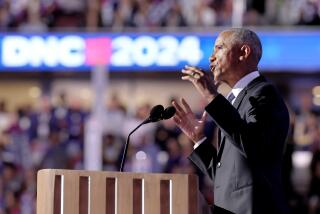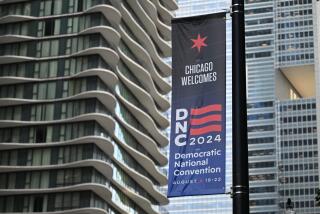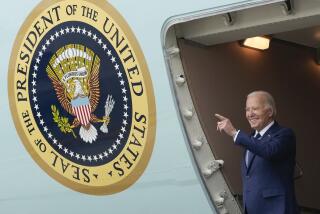Panel Seeks Ways to Pep Up Political Conventions
- Share via
WASHINGTON — Less than six months after turning their national political conventions into elaborately scripted speech and video shows, Republican and Democratic party leaders Wednesday announced a new bipartisan commission aimed largely at making the gatherings more attractive to television viewers.
“Some of the network people indicated to me that professional wrestling actually did better on some of the alternate channels than the Democratic and Republican conventions,” retiring Republican National Chairman Frank J. Fahrenkopf Jr. told a news conference.
“One of the things we’re going to be looking at is whether or not the convention process can be streamlined in some way to make it crisper and clearer from the standpoint of presenting a program that will attract more Americans to watch it,” Fahrenkopf said.
He and former Democratic National Chairman Charles T. Manatt will be co-chairmen of the Bipartisan Commission on National Political Conventions, a 38-member group of party and elected officials, political consultants, academics and TV news correspondents.
Fahrenkopf said that the study, to be coordinated by the Center for Democracy, a nonprofit institute, was sparked by criticism of the 1988 conventions and by one of the lowest voter turnouts in history last November.
Manatt said that the commission will seek to determine whether the format of the conventions, at which nominations used to be decided by multiple ballots and brokered votes, is out of step with changes that have enabled candidates to sew up nominations in state primaries and caucuses.
“There has been criticism by many in the media that these events have become nothing more than staged activities in which nominees give canned speeches,” Fahrenkopf said. “By the same token, there are many in the parties and many academicians who believe that the conventions are . . . a healthy catalyst for political activity.”
One question to be explored, he said, is whether it is right for TV networks to conduct interviews in their anchor booths instead of showing “a speaker who the political parties think has a significant message for the American people.”
Actually, at the last GOP convention, when a storm burst over George Bush’s choice of Dan Quayle as his running mate, the Bush campaign was only too eager to make three top aides and Quayle himself available for anchor-booth interviews during prime-time action on the podium.
The convention study panel was created nearly two years after the political parties had formed a bipartisan commission that ran all three presidential debates between Republican Bush and Democrat Michael S. Dukakis last fall.
That action infuriated the League of Women Voters, which traditionally had sponsored such debates. It pulled out of staging the one in Los Angeles, mostly to protest demands that the candidates not be allowed to engage in free-wheeling, direct exchanges.
More to Read
Get the L.A. Times Politics newsletter
Deeply reported insights into legislation, politics and policy from Sacramento, Washington and beyond. In your inbox twice per week.
You may occasionally receive promotional content from the Los Angeles Times.










